Words_ Phrases and Grammatical__ Points2
Unit2lessonsfromJefferson(格式正确版)
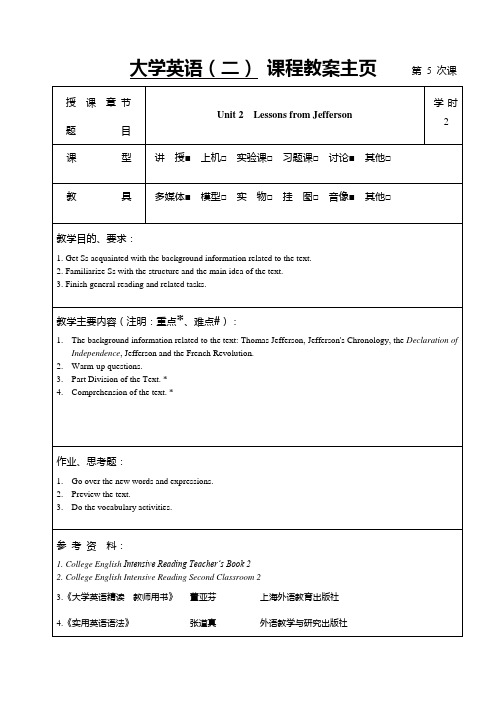
大学英语(二)课程教案主页第5 次课闽南理工学院备课笔记第5 次课Unit 2 Lessons from JeffersonI. Teaching Purposes1. Be acquainted with the background information related to the text-- Thomas Jefferson, Jefferson's Chronology, the Declaration of Independence.2. Familiarize the students with the main idea of the text.3. Master the new words and expressions.II. Teaching Procedures1. Lead-in (5 mins)2. Before Reading (40 mins)1) Warm-up questions2) Background information3) New words and Phrases3. Global Reading (45 mins)1) Introductory Remarks2) Part Division of the Text3) Comprehension of the TextIII. Teaching ContentsI) Lead-in (5 mins)II) Before Reading (40 mins)1. Warm-up questions1) Of the American presidents, how many do you know?2) Can you recognize the people in the following pictures and say something about them?2. Background information1) Thomas JeffersonThomas Jefferson (1743-1826) is best remembered as a great President and as the author of the Declaration of Independence. He also won lasting fame as a diplomat, a political thinker, and a founder of the Democratic Party. (民主党) Jefferson's interests and talents covered an amazing range. He became one of the leading American architects of his time and designed the Virginia Capitol, the University of Virginia, and his own home, Monticello. He greatly appreciated art and music and tried to encourage their advancement in the United States. Jefferson invented a decoding device, a lap desk, and an improved type of moldboard plow. His collection of more than 6400 books became a major part of the Library of Congress. Jefferson revised Virginia's laws and founded its state university. He developed the decimal system of coinage that allows Americans to keep accounts in dollars and cents. Jefferson did not consider himself a professional politician. Instead, he regarded himself as apublic-spirited citizen and a broadminded, practical thinker. He preferred his family, his books, and his farms to public life. But he spent most of his career in public office and made his greatest contribution to his country in the field of politics.2) The Declaration of IndependenceIn April 1775, colonists in Massachusetts took up arms against British troops. The American Revolution had begun. The following year, the Continental Congress in Philadelphia asked Jefferson to write a document declaring America's independence from Britain. The Continental Congress approved Jefferson's work with few changes. The Declaration of Independence was adopted on July 4, 1776. The bonds that tied the colonies to Britain were broken. Jefferson wanted the reasons for America's independence stated clearly so the world would第 1 页闽南理工学院备课笔记第5 次课understand. He wrote "all men are created equal," with rights to "life, liberty, and the pursuit of happiness." Governments are created to secure people's rights. The people could change a government that no longer protected their rights.3) Jefferson and the French RevolutionJefferson served as minister to France from 1785 to 1789 when revolution was imminent in France. He sympathized with the revolution, feeling it was similar in purpose to the American.3. New words and PhrasesMake the students read the new words and phrases, and then ask some students read the words and phrases, correct the pronunciation.III) Global Reading (45 mins)1. Introductory RemarksThomas Jefferson was the third president of the United States and the author of the Declaration of Independe nce. He was a versatile man, with interests ranged widely. Here are some of his ideas and examples as mentioned i n the text: “go and see”;“you can learn from everyone”;“Judge for yourself”;“Do what you believe is right”;“Tr ust the future, trust the young”. These are still of great benefit to us now.2. Part Division of the TextPart1 (Para.1): A brief introduction to Thomas Jefferson.Part2 (Para.2-8): Some ideas and principles given by Thomas Jefferson.Part 3 (Para 9-11):His talents in many fields and his contribution to USA3. Comprehension of the Text1) Who wrote the Declaration of Independence? ca. George Washington.b. Abraham Lincoln.c. Thomas Jefferson.d. Benjamin Franklin.2) Jefferson made on-the-spot observations of the South Branch of the James River because__b__.a. he was the youngest member of the committeeb. he believed that personal investigation was an important source of knowledgec. he was not interested in the papers about the riverd. he was sure what had been written about the river was misleading3). It can be inferred from the text that Lafayette did not understand the French Revolution because __b____.a. being a nobleman himself, he took the side of the highest social classb. he was divorced from the common peoplec. he misinterpreted the cause of dissatisfaction among the peopled. he failed to act on Jefferson’s advice4). Jefferson attached greater importance to newspapers than to a government because he believed that___a___.a. the people themselves had the ability to make correct judgments if they were well informedb. newspapers never refused to accept people’s opinions as governments often didc. no government could be trustedd. newspapers always told the truth5). Jefferson was determined never to answer his critics because __c____.a. he thought there was no sense in defending obviously correct ideas第 2 页闽南理工学院备课笔记第5 次课b. he believed silence was a source of strengthc. he believed conflict was inevitabled. he knew the more he said, the more they would resent him.6). what did Jefferson mean when he said “How much pain has been caused by evils which have never happened!”? aa. It was pointless to worry about the future.b. Evils were not to be feared.c. Constitutions and laws should be made perpetual.d. Changes in society necessarily involve pains.7). we can learn from the text that Jefferson was ___d___.a. a man of great courageb. an idealistc. a man of many talentsd. all of the above8). In Jefferson’s view, a nation could remain free only if ___a___.a. its people are well-educatedb. it is industrializedc. its people enjoy perfect equalityd. its people understand self-evident truths第 3 页大学英语(二)课程教案主页第6 次课闽南理工学院备课笔记第6 次课Unit 2 Lessons from JeffersonI. Teaching Purposes1.Make Ss further understand the text content and structure.2.Teach Ss how to use some key words and phrases in the text.3.Make Ss understand how to analyze long and complicated sentences in the text.II. Teaching Procedures1. Review the text structure and new words (10 minutes)2. Study some key words and complicated sentences in the text. (80 minutes)III. Teaching Contents1. Detailed Reading1. Go and see. Jefferson believed that a free man obtains knowledge from many sources besides books and that personal investigation is important. When still a young man, he was appointed to a committee to find out whether the South Branch of the James River was deep enough to be used by large boats. While the other members of the committee sat in the state capitol and studied papers on the subject, Jefferson got into a canoe and made on-the-spot observations.2.(L7-8)…Jefferson believed that a free man obtains knowledge from many sources besides books and that personal investigation is important.1). Explain the grammatical structure of the sentence.主句Jefferson believed 为一般过去时,而后面从句却用了一般现在时,说明叙述的内容为人们普遍接受的客观道理。
新进阶3综合unit2答案(20210109231853)
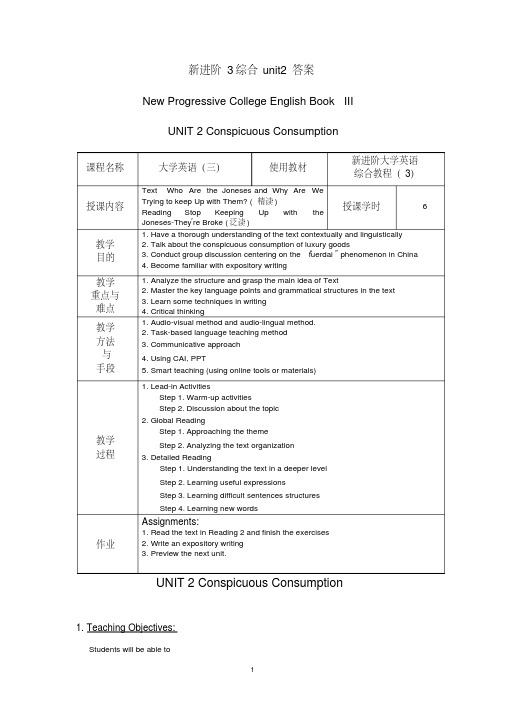
新进阶3综合unit2答案New Progressive College English Book III UNIT 2 Conspicuous Consumption课程名称大学英语(三)使用教材新进阶大学英语综合教程(3)授课内容Text Who Are the Joneses and Why Are WeTrying to keep Up with Them? (精读)Reading Stop Keeping Up with theJoneses-They’re Broke (泛读)授课学时 6教学目的1. Have a thorough understanding of the text contextually and linguistically2. Talk about the conspicuous consumption of luxury goods3. Conduct group discussion centering on the “fuerdai” phenomenon in China4. Become familiar with expository writing教学重点与难点1. Analyze the structure and grasp the main idea of Text2. Master the key language points and grammatical structures in the text3. Learn some techniques in writing4. Critical thinking教学方法与手段1. Audio-visual method and audio-lingual method.2. Task-based language teaching method3. Communicative approach4. Using CAI, PPT5. Smart teaching (using online tools or materials)教学过程1. Lead-in ActivitiesStep 1. Warm-up activitiesStep 2. Discussion about the topic2. Global ReadingStep 1. Approaching the themeStep 2. Analyzing the text organization3. Detailed ReadingStep 1. Understanding the text in a deeper level Step 2. Learning useful expressionsStep 3. Learning difficult sentences structuresStep 4. Learning new words作业Assignments:1. Read the text in Reading 2 and finish the exercises2. Write an expository writing3. Preview the next unit.UNIT 2 Conspicuous Consumption1. Teaching Objectives:Students will be able toA. Have a thorough understanding of the text contextually and linguisticallyB. Talk about the conspicuous consumption of luxury goodsC. Conduct group discussion centering on the “fuerdai” phenomenon in ChinaD. Become familiar with expository writing2. Time Allotment:1st Period: Lead-in Activities (Warm-up activities; Discussion about the topic)2nd Period: Global-reading (Text: Approaching the theme; analyzing the text organization) 3rd Period: Detailed reading (Understanding the Text A in a deeper level, analyzing difficult sentence structures)4th Period: Detailed reading Activities (Learning new words, summarizing good usage)5th Period: Comprehending Reading 1 (Skimming the text, explaining the difficult sentences of the Text, doing sentence translation))6th Period: After-reading Activities (Viewing and Listening; Speaking; Assignments)3. Teaching Procedures:3.1 Lead-in ActivitiesStep 1. Warm-up activitiesAsk Ss to listen to a song and fill in the missing words in the lyrics.Have Ss work in pairs. One student asks the other the questions in Opener, the other answers. Then switch roles.Method: PPT, communicative approach.Step 2: Discussion about the topicIntroduce the topic of the unit to Ss either in English or Chinese: Sometimes people buy things just for the purpose of showing that they are richer, or have better taste than others. Expensive brand-name goods can serve this purpose, and are often wanted precisely because they are expensive. Whether spending money in this way is good, bad or simply silly is something weare going to explore.Method: Using task-based language teaching method, communicative approach.3.2 Global readingStep 1. Approaching the themeAsk Ss to take a look at the Culture Notes, or ask them to do some further reading before class about the idiom “keep up with the Joneses”, its origins and its social impact,etc.Guide Ss to explore the text to fide the meaning and origin of the expression “keep up with the Joneses”, how this phenomenon came into being, and what we should do to rid ourselves ofthe pressure of keeping up with the Joneses.Method: PPT; communicative approach.Step.2 Analyzing the text organizationThe teacher tells students that the text can be divided into three parts which have been givenin the Text Organization. Then students should summarize the main idea of each part and compare notes with each other.Parts Paragraphs Functions Main IdeasPart One Para. 1-2Bringing up the social phenomenonof conspicuous consumptionThe meaning and origin of theexpression “keep up with theJoneses”Part Two Paras. 3-6Explaining how it occurs and why How the phenomenon of keeping upwith the Joneses came into being and why people buy into it.Part Three Paras. 7-10Exploring ways of dealing with it What we should do to free ourselvesfrom the pressure of keeping up withthe Joneses.Method: skimming and scanning, communicative approach3.3 Detailed Reading3.3.1 Procedure1) Students are asked to read the passage carefully again and for each paragraph (sometimestwo-three paragraphs), invite students to answer questions related difficult sentences andunderstanding of each paragraph.2) Help Ss find out the good usage in the text and underlined them.3) Learn new words in details.Purpose: Further understand the text and train scanning ability to learn difficult sentencestructures as well as new words and expressions.Method:Reading the text together; Using task-based language teaching method, readingapproach, communicative approach, grammar-translation approach.Step 1. Questions related difficult sentences and understanding of each paragraph.Paras.2Q. Where does the phrase “Keeping up with the Joneses” come from?A: It comes from a cartoon strip of the same title launched by Pop Momand in 1913.Para.3&4Q: Why were we not aware of what the Joneses were doing prior to the late 1880s?A: Prior to the late 1880s, mass media was not born. We were only concerned about making ourown living.Para.4Q: What was the ready solution provided by magazines in order for us to catch up with theJoneses?A: The ready solution was to buy products that were advertised.Para.9Q: Where do true happiness and joy come from, if they are not anything money can buy?A: True happiness and joy come from within.Paras.10Q: What are we supposed to do to stop keeping up with the Joneses?A: Instead of buying into the message that we’re not good enough, we should have positiveself-regard. We should realize we don’t have to buy things to impress others.3.3.2 Language Focus3.3.2.1 Difficult sentences:1) I’d love to say that need vanished when the last episode of that comic strip ran, but alas, itseems to have only gotten worse. (Para. 2)I would like to say that need disappeared when the comic strip came to an end, but it seems thatthings have turned from bad to worse instead.我多么想说,随着最后一集连环漫画的结束,这一心态也不复存在了。
全效学习英语八年级下册第二单元作文

全效学习英语八年级下册第二单元作文全文共3篇示例,供读者参考篇1Unit 2 of the eighth grade English textbook is all about effective learning methods, which are crucial for students to succeed in their English studies. In this unit, students will learn various strategies and techniques to improve their English skills, such as reading, writing, listening, and speaking.One of the most important aspects of effective learning is developing good study habits. This includes setting aside dedicated time for studying each day, staying organized, and taking regular breaks to rest and recharge. By establishing a routine and sticking to it, students can better focus on their studies and retain more information.Another key skill for successful language learning is active listening. This involves paying close attention to the speaker, asking questions for clarification, and taking notes to remember key points. By actively engaging with the material, students can improve their comprehension and retention skills.Reading is also an essential component of language learning. Students should make a habit of reading English texts regularly to expand their vocabulary and improve their reading comprehension. They can also practice summarizing texts, highlighting important information, and making connections between different ideas to deepen their understanding.Writing is another important skill for students to develop. By practicing writing regularly, students can improve their grammar, sentence structure, and overall communication skills in English. They can also learn how to express their thoughts and ideas clearly and coherently, which is essential for academic and professional success.Lastly, speaking is a crucial aspect of language learning. Students should practice speaking English as much as possible, whether through conversations with classmates, role-playing exercises, or presentations. By speaking regularly and receiving feedback from teachers and peers, students can improve their pronunciation, fluency, and confidence in using English.In summary, Unit 2 of the eighth grade English textbook provides students with valuable tips and techniques to enhance their English learning. By developing good study habits, actively listening, reading regularly, practicing writing, and speaking asmuch as possible, students can improve their English skills and achieve success in their academic and professional endeavors.篇2Title: The Importance of Comprehensive Learning in English StudyLearning a new language is a complex and challenging task, especially for students in eighth grade. In order to achieve fluency and proficiency in English, it is important to adopt a comprehensive learning approach that includes a variety of methods and strategies. In this essay, I will discuss the importance of comprehensive learning in English study and provide some tips on how to effectively improve language skills in the eighth-grade curriculum.One of the key aspects of comprehensive learning is developing all four language skills: listening, speaking, reading, and writing. To improve listening skills, students can practice by listening to English podcasts, watching English movies and TV shows, and engaging in conversations with native speakers. Speaking skills can be enhanced by participating in English language clubs, giving presentations, and practicing pronunciation through tongue twisters and vocal exercises.Reading is another crucial skill that should be developed in English study. Students can improve their reading skills by reading a variety of materials, such as novels, newspapers, magazines, and online articles. They can also work on their vocabulary by keeping a word journal and learning new words through flashcards and quizzes.Writing is the final language skill that students should focus on in their English study. To improve writing skills, students can practice writing essays, letters, and reports on various topics. They can also receive feedback from teachers and peers to help them identify and correct errors in their writing.In addition to developing language skills, comprehensive learning in English study should also include cultural aspects of the language. Students should learn about the history, customs, and traditions of English-speaking countries to gain a deeper understanding of the language and its speakers.To sum up, comprehensive learning is essential foreighth-grade students to successfully master the English language. By developing all four language skills, reading a variety of materials, practicing writing essays, and learning about English-speaking cultures, students can become fluent and proficient in English. With dedication, hard work, andperseverance, students can achieve success in their English study and unlock the doors to countless opportunities in the future.篇3Unit 2 in the eighth grade English textbook covers a wide range of topics related to effective learning. From setting goals to developing good study habits, this unit provides students with valuable insights into how they can improve their English language skills. In this essay, we will explore the key concepts and strategies discussed in Unit 2, as well as provide some additional tips for successful language learning.One of the first topics covered in Unit 2 is the importance of setting goals. Without clear objectives in mind, it can be difficult for students to stay motivated and focused on their studies. By setting specific, achievable goals, students can track their progress and see tangible results over time. Whether it's improving their vocabulary, grammar, or pronunciation, having a goal in mind can help students stay on track and work towards continuous improvement.Another important concept discussed in Unit 2 is the idea of forming good study habits. This includes creating a consistent study schedule, finding a quiet and comfortable place to work,and eliminating distractions. By developing a routine that works for them, students can maximize their learning potential and make the most of their study time. Additionally, Unit 2 emphasizes the importance of using a variety of study materials, such as textbooks, online resources, and language apps, to keep things interesting and engaging.In addition to setting goals and forming good study habits, Unit 2 also touches on the importance of practicing regularly and seeking feedback from teachers or peers. Language learning is a skill that requires consistent practice and feedback in order to improve. By practicing speaking, listening, reading, and writing on a regular basis, students can reinforce their skills and become more confident in using English in real-life situations. Seeking feedback from others can also help students identify areas for improvement and receive guidance on how to address them.To supplement the strategies and tips provided in Unit 2, here are some additional suggestions for effective English language learning:1. Engage with the language outside of the classroom: Watch movies, listen to music, read books, and engage with native speakers to expose yourself to different forms of English and improve your language skills.2. Keep a language journal: Write down new vocabulary words, phrases, and grammatical structures that you come across in your studies. Reviewing these notes regularly can help you retain information and expand your language knowledge.3. Practice speaking with others: Whether it's finding a language partner or participating in language exchange programs, speaking with others in English can help improve your fluency and confidence in using the language.4. Set aside time for self-study: In addition to classroom lessons, dedicate time each day to review materials, practice exercises, and work on improving specific language skills.In conclusion, Unit 2 of the eighth grade English textbook offers valuable insights and practical tips for effective language learning. By setting goals, forming good study habits, practicing regularly, and seeking feedback from others, students can improve their English language skills and become more confident and proficient in using the language. Additionally, by engaging with the language outside of the classroom and incorporating self-study activities into their routines, students can further enhance their language abilities and make progress towards achieving their language learning goals.。
Unit2__Language__points__精品教案
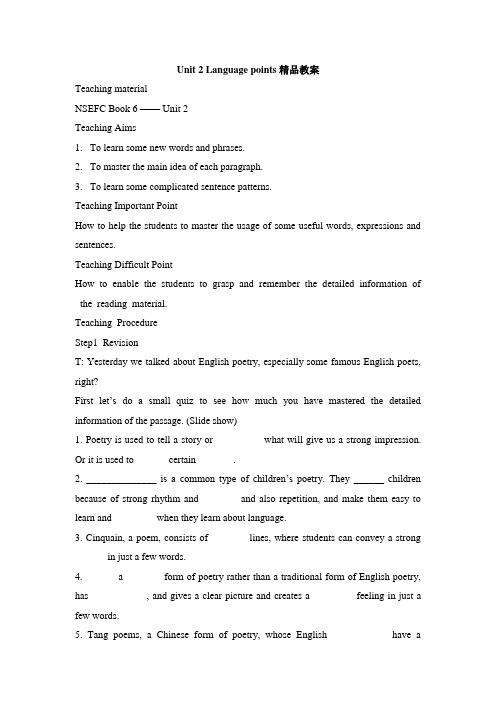
Unit 2 Language points精品教案Teaching materialNSEFC Book 6 —— Unit 2Teaching Aims1.To learn some new words and phrases.2.To master the main idea of each paragraph.3.To learn some complicated sentence patterns.Teaching Important PointHow to help the students to master the usage of some useful words, expressions and sentences.Teaching Difficult PointHow to enable the students to grasp and remember the detailed information of the reading material.Teaching ProcedureStep1 RevisionT: Yesterday we talked about English poetry, especially some famous English poets, right?First let’s do a small quiz to see how much you have mastered the detailed information of the passage. (Slide show)1. Poetry is used to tell a story or _________ what will give us a strong impression. Or it is used to ______ certain _______.2. ______________ is a common type of children’s poetry. They ______ children because of strong rhythm and _______ and also repetition, and make them easy to learn and ________ when they learn about language.3. Cinquain, a poem, consists of _______ lines, where students can convey a strong ______ in just a few words.4. ______ a _______ form of poetry rather than a traditional form of English poetry, has ___________, and gives a clear picture and creates a ________ feeling in just a few words.5. Tang poems, a Chinese form of poetry, whose English ___________ have a_______ form, is so popular that English speakers like to __________ it.Keys: 1. describe; convey; emotions 2. Nursery rhymes;delight;rhyme;recite3.five; picture4.Haiku; Japanese; 17 syllables; special5. translations; free; copyStep 2: Language pointsT: OK, now would you please open your textbook and turn to page 18——English poetry. Have you noticed that in some paragraphs, there are some words in bold? Please pay attention to these words and make clear what do the words in bold refer to. Ok, let’s read the first paragraph together.T: I think you must have got a first impression of English poetry. This class let’s study the passage in details. In my opinion, this passage is not easy. So some language points may help you to understand it better. (Slide show)1.Some poems tell a story or…Others try to convey certain emotion.convey 1)传达,表达(感情,意见,思想等)He was sent to convey a message to the U.N. Secretary General.convey sth to sb.向某人传达,表达(感情,意见,思想等)convey a sense/an impression/an idea etcI want to convey to children that reading is interesting.2)传送,运送(可与from, to连用)Wires convey electricity from power stations to the users.Your luggage will be conveyed to the hotel by taxi.2.Nursery rhyme are still a common type of children’s poetry. They delight small ch ildren because…delight1)[u] 欢喜,高兴,愉快I read your new book with real delight.2)[c]乐事;讨人喜欢的人,爱好的事物Your little dog is a real delight.3) vt. 使喜欢,使高兴He delighted the audience with his performance.。
Unit4CareerPlanning新编大学英语第二版第三册教案
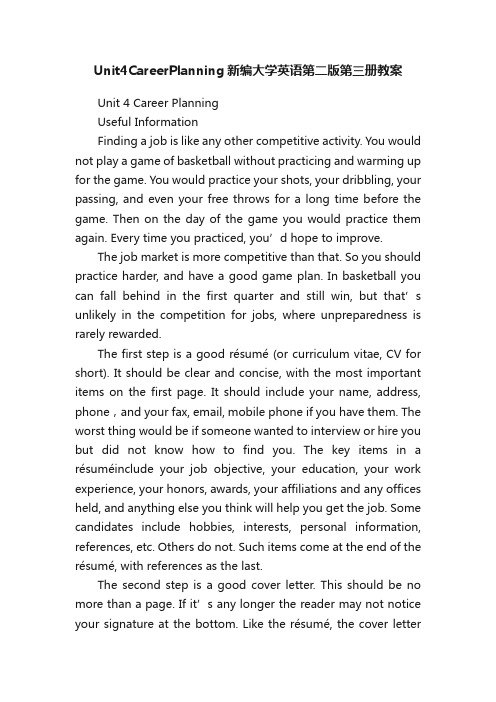
Unit4CareerPlanning新编大学英语第二版第三册教案Unit 4 Career PlanningUseful InformationFinding a job is like any other competitive activity. You would not play a game of basketball without practicing and warming up for the game. You would practice your shots, your dribbling, your passing, and even your free throws for a long time before the game. Then on the day of the game you would practice them again. Every time you practiced, you’d hope to improve.The job market is more competitive than that. So you should practice harder, and have a good game plan. In basketball you can fall behind in t he first quarter and still win, but that’s unlikely in the competition for jobs, where unpreparedness is rarely rewarded.The first step is a good résumé (or curriculum vitae, CV for short). It should be clear and concise, with the most important items on the first page. It should include your name, address, phone,and your fax, email, mobile phone if you have them. The worst thing would be if someone wanted to interview or hire you but did not know how to find you. The key items in a résuméinclude your job objective, your education, your work experience, your honors, awards, your affiliations and any offices held, and anything else you think will help you get the job. Some candidates include hobbies, interests, personal information, references, etc. Others do not. Such items come at the end of the résumé, with references as the last.The second step is a good cover letter. This should be no more than a page. If it’s any longer the reader may not notice your signature at the bottom. Like the résumé, the cover lettershould go through several careful drafts, with advice from an instructor or some other experienced people. Other documents such as personal statements and application forms may be required. These should be prepared just as thoroughly and conscientio usly as the letter and the résumé.Now you are almost ready for the bottom line of the job-hunting process: the interview. The job may be gained or lost in the first 30 seconds of the interview, so you should practice this part several times, including your entry, greetings, etc. Bring several copies of your résumé to the interview in case the committee members don’t have them, and be prepared to hand these out at the beginning. It’s also good to practice the entire interview. Answers should be clear and concise, including relevant specific examples of your education or experience. One good example can be worth several minutes of general discussion. Here are some good questions to practice answering before the interview.Part One Preparation1.2.34.5.6.7.8.9.3. Matching GameSection A 1) job 2) career 3) profession 4) tradeSection B 1) pay 2) fee 3) salary, wages 4) incomeSection C 1) job-seeker 2) employer 3) fire 4) interviewPart Two Reading-Centered ActivitiesIn-Class ReadingI. Pre-Reading1. Samples1) It’s a job which requires a lot of skills in de aling with people. For example, they should have a very good attitude towards people and provide good service for those who come to their office. Their main task involves doing paperwork in the office, answering phone calls and helping people go through formalities. They have a steady salary, and lead a comparatively leisurely life. They don’t have to go on business often. They go to work at 9 in the morning, and get back home at 5 in the afternoon. They will not be fired easily because they are employed by the government. Not many people would like to take the job before, but now it’s very hot. People even have to take and pass tests to get employed, and the competition is tough. The government keeps raising the salary of these people partly in order to keep them from corruption.(Answer: government office worker, or civil servant)2) First of all, I am working very hard on my subjects, especially English. To pass CET band 4 and 6 is a must for a better job. In the English class, I am very active in group discussions because I know getting the certificate of CET is not enough. I am also involved in some social work in the university in order to get myself prepared for serving society, so that I can form a good relationship with my colleagues and business partners. Warm-heartedness is also a very important attribute for my futurecareer. I participated in a couple of money-raising activities to help those victims of floods and earthquakes. If possible, I would also learn to drive. Having a driver’s license wi ll enable me to stand a better chance in the job market, I think. Well, it seems that I have a lot to do to get ready for the future.II. Passage ReadingWords, Phrases and Grammatical Points1. career (l.1), occupation (l.7), professional occupation (l.8), job (l.11), line of work (l.59)career (职业, 一生的事业): the type of work that you do or wish to do for most of your working life, especially where this involves several similar jobs over a long period of timeI) Like his father, T om chose a career in the army.II) Later on in his career he became first secretary at the British Embassy in Washington.occupation (工作,职业): a word used especially in an official context meaning someone’s usual full-time jobI) Please fill in the details of your present occupation.II) Men in manual occupations tend to be less prone to stress-related illnesses.professional occupation (= profession)(专业,职业): a type of work which people usually regard with respect, such as teaching, medicine , or law, for which you need special training and have to pass special examinations.I) Teaching is a profession that requires total commitment.II) Medicine has always been a very male-dominated profession.job(工作,职业): the particular activity that someone does regularly in order to earn money, especially when they are employed by someone elseI) Paul starts his new job on Monday.II) The factory closed down last month and 1800 people lost their jobs.line of work(行业,行当): the type of work or job that you doI) I meet some interesting people in my line of work.II) I didn’t realize we were both in the same line of work.2. …estimating the probable outcomes of various courses of action, … (l. 4)The word ―estimate‖ can also be used as a no un, meaning ―judgment or calculation of the approximate size, cost, value, etc. of something (估计,估价)‖.I) According to their estimates, the company will go bankrupt within two years.II) The number of people who applied for the course was 120 compared with an initial estimate of between 50 and 100.―Estimation‖ is the noun form of the verb estimate, meaning ―one’s opinion of the value, nature, etc. of someone or something (评价,判断)‖. It is often used in the phrase ―in one’s estimation‖.I) He was, in my estimation, not capable of doing the job.II) In my estimation, a lot of banks are going to have the same problem.3. …are unable to express any choices of occupation (l.11)This part of the sentence means: are not able to say what jobs they should choose.4. ...., but that does not describe career decisions. (l.22)Here ―that‖ refers to the previous clause ―…complacency is appropriate for any decision in which nothing much is at stake‖.5. engage in (l. 23):1)从事,忙于(通常用被动态)He is engaged in writing a novel.2)吸引The new toy didn’t engage the children’s interest for long.3) 雇用,聘用His father engaged a private tutor to improve his math.4) 预定I’ve engaged a room at the hotel.engaged: adj.1)定婚的Have you met the man she’s engaged to ? 你是否见过她未婚夫?2)(电话)占线Sorry! The line / number is engaged.6. confront (l. 24) and face (l.70)The word ―confront‖ means ―face, meet or deal with (a difficult situation or person)‖ while ―face‖ means ―(cause or force to) recognize, th ink about, accept or deal with (a problem or diff iculty)‖.confront:I) When he returned to his office he was confronted by/witha great pile of work.II) She was confronted with the biggest crisis of her political life.III) We need to confront these prob lems before it’s too late.face:I) They face / are faced with financial penalties.II) The country is now faced with the prospect of war.III) We have to face the reality that, so far, the treaty has had little effect.7. …some people remain calm by resor ting to wishfulthinking or daydreaming. (l. 25)In the phrase ―resort to‖, ―to‖ is a preposition, so it should be followed by either nouns or gerunds.I) I had to resort to violence to get my money.II) When she didn’t answer the telephone I resorted to standing outside her window and calling up to her.If someone does something as a last resort/in the last resort (作为最后的手段,最后的凭借), that means what one will do if everything else fails.I) Nuclear weapons should be used only as a last resort.II) We could ask our parents for the money, as a last resort.III) In the last resort we can always walk home.III. Post-ReadingReading Comprehension1. 1) Introduction (Para. 1):Career planning does not necessarily follow routine or logical steps.2) Students’ weaknesses in career planning (Para. 2):i. Most students choose from a very narrow group of occupations.ii. 40 to 60 percent of the students choose professional occupations, but only15 to 18 percent of the work force is engaged in professional work.iii. Young men lack interest in fields that offer many job opportunities.iv. A third of the students are unable to express any choice of occupation.3) Serious flaws in the ways of decision making (Para. 3-5)i. Complacency – ignoring challenging information.ii. Defensive avoidance –resorting to wishful thinking or daydreaming.iii. Hypervigilance –searching frantically for career possibilities and seizingon hastily invented solutions.4) Keys to career planning (Para. 6-11)i. Study yourself.ii. Write your career goals down.iii. Review your plans and your progress periodically with another person.iv. If you choose a career that does not fit you, you can start over.5) Changes in careers (Para. 12-13)i. Few changes involve downward movement; most involve getting ahead.ii. Job changes and career shifts occur at all ages.6) Conclusion (Para. 14-15)Although there is no sure way to make career plans work out, there are things that you can do now to shape your career possibilities.2. 1) T 2) T 3) F 4) T 5) F 6) T 7) T 8) T 9) T 10) F 11) T 12) F3. Job Application and RecruitmentAn alternative activity for the teacher to organize for the class: The teacher may organize an interview in the following way:1) Choose an interview panel of three or four students. Choose three students for the panel to interview for the job of a store detective. Hold the interviews. When they are over, the panel should discuss the qualifications of the applicants and choose the one they think is best.2) Ask the class to talk about the interviews. Ask questions such as:A. Do you agree with the panel’s decision?B. How could the applicants have done better?C. Were the interviews fair?Sample answers-- I agree with the panel’s decision. First, the applicant is very confident in answering the questions and he knows what he is supposed to do. Second, he is quick-minded and very strong. Third, he is interested in the job and is ready to dedicate himself to the job. Finally, he has previous experience in working as a store detective.-- I don’t agree with the panel’s decision. I t hink the panel puts too much emphasis on the appearance of the applicants. I think Applicant B is much more suited for the job. He has a warmer personality. He can be a good store detective as well as a good staff member, because I don’t think the sole responsibility for a detective is to check on the shopp ers. He should also help the customers when possible.-- Generally speaking, I think the panel has made a wise decision and chosen the right one for the job. Yet I think the applicant could have done better by not being so conceited and bragging about his own ability. After all, people cannot trust too much what a person says about himself without further investigation. What’s more, team spirit is very important. If he is not easy-going and feels too good about himself, it will be difficult for others to cooperate with him. Also I doubt whether he will be listening to the boss.Vocabulary1. 1) acceptable 2) efficiency 3) implications 4) instability 5)rationalize6) evaluation 7) foreseeable 8) invention 9) hastily 10) probability11) professional 12) challenging 13) defensive 14) personality2. 1) in case 2) Every so often 3) resort to 4) talk over 5) start over6) in reality 7) at stake 8) seized on 9) leading to 10) take stock of3. 1) programs 2) way 3) technical 4) both 5) provided 6) who7) such 8) needed 9) opportunities 10) when 11) to 12) Completion 13) holding 14) early 15) hire 16) promote 17) up 18) educatingTranslation1. He underwent a major heart surgery several years ago.2. We estimated that it would take a week to finish the work.3. I used to enjoy photography, but I now have no time to pursue any hobbies.4. You may love someone but not necessarily have to marry him.5. Terrorists resort to violence to achieve their political aims.6. He says he’ll stay in the office this afternoon in case you want to see him.7. Scientists have identified the gene that causes abnormal growth.8. These examples demonstrate how badly some students write their résumés.Part Three Further Development1. Enriching Your Word Power1) A 2) B 3) C 4) B 5) C 6) A 7) C 8) B 9) B 10) C2. Interpreting Proverbs1) All work and no play makes Jack a dull boy. 只工作不玩耍,聪明孩子也变傻。
《新视野大学英语读写教程》(第二册)Unit 1 Time-Conscious Americans
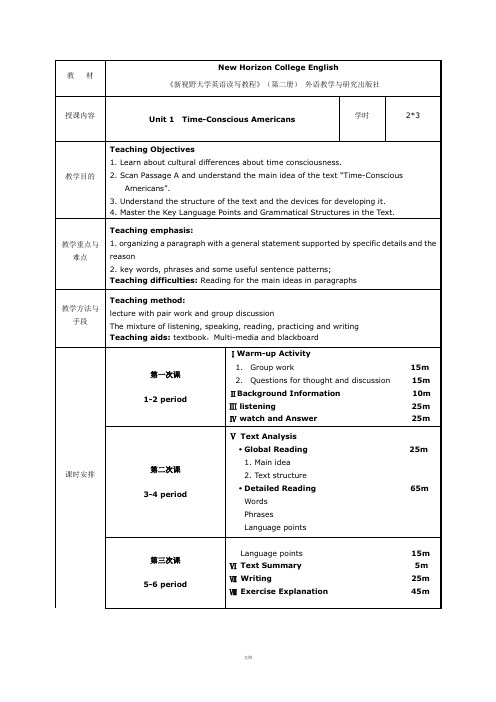
Ⅴ Text Analysis ·Global Reading 1. Main idea 2. Text structure ·Detailed Reading Words Phrases Language points
15m 15m 10m 25m 25m
25m
65m
第三次课 5-6 period
ⅣListen and Answer (提问 视频)
Directions: Listen to a passage about people’s attitude toward time in the US and answer the following questions according to what you hear. 1. What does time mean to us? 2. What should we do with time?
3-4 Period
文档
Americans”. 3. Understand the structure of the text and the devices for developing it. 4. Master the Key Language Points and Grammatical Structures in the Text.
Ⅱ Background Information: (讲解 课件)
1. Cultural Conflicts: Each nation has its own conventions. Different nations have different cultures. When two cultures clash, problems in communication may occur. Which side should compromise when there are cultural conflicts? In fact, knowing and understanding the other's culture is the responsibility of both sides, and both sides should be willing to compromise. Educating, rather than complaining and blaming, is the best solution to cultural conflicts.
2019外研版高中英语选择性必修二Unit2 单元语法详解课件 (2)
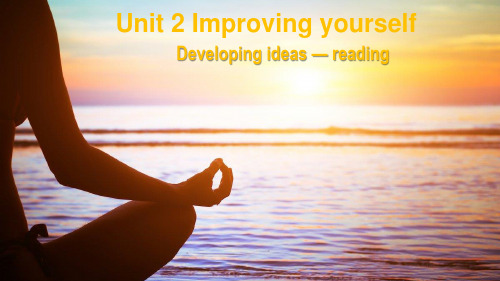
Developing ideas — reading
目 录
contents
I Pre-reading
Ⅳ Post-reading
II Fast reading
Ⅴ Language points
III Intensive reading Ⅵ Homework
Language points: Important words
2. invest v ③ 投入(时间、精力等)
She had invested all her adult life in the relationship. 她把成年后的时间全用于维护那一关系。 ④ 授予;给予(权力等) The new position invested her with a great deal of responsibility. 新职位赋予她重大的责任。
V Language points
Language points: Important words
1. require requirement n 所需的东西(常用复数)
v ① 需要;依靠;依赖 These pets require a lot of care and attention. 这些宠物需要悉心照顾。 ② 使做(某事);规定…… All candidates will be required to take a short test. 所有候选者都要参加一次小测验。
Saving jar It gives you a vision for 3. t_h_e_f_u_tu_r_e_. This could involve saving for university or saving for 4. t_h_a_t_s_p_e_c_ia_l_s_o_m_e_t_h_in_g__y_o_u_’v_e__s_e_e_n_i_n_t_h_e _s_to_r_e_s_.
新视野大学英语第三版第二册Unit4教案
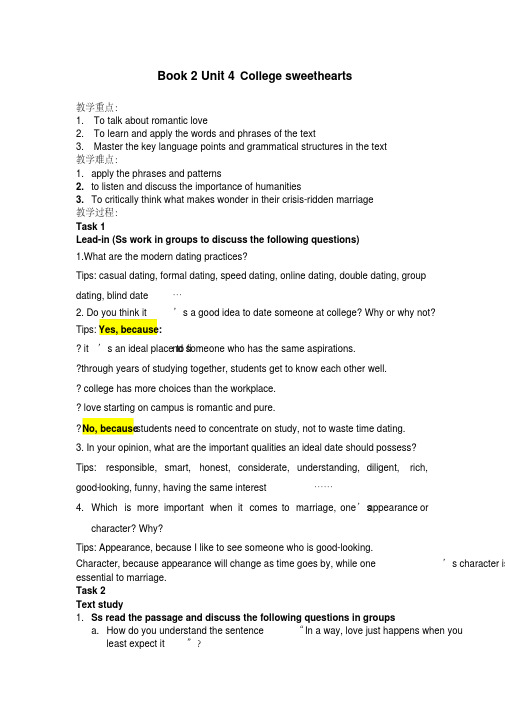
Book 2 Unit 4 College sweethearts教学重点:1.To talk about romantic love2.To learn and apply the words and phrases of the text3.Master the key language points and grammatical structures in the text教学难点:1.apply the phrases and patterns2.to listen and discuss the importance of humanities3.To critically think what makes wonder in their crisis-ridden marriage教学过程:Task 1Lead-in (Ss work in groups to discuss the following questions)1.What are the modern dating practices?Tips: casual dating, formal dating, speed dating, online dating, double dating, groupdating, blind date…2. Do you think it’s a good idea to date someone at college? Why or why not?Tips: Yes, because:nd someone who has the same aspirations.? it’s an ideal place to fi?through years of studying together, students get to know each other well.? college has more choices than the workplace.? love starting on campus is romantic and pure.? No, because students need to concentrate on study, not to waste time dating.3. In your opinion, what are the important qualities an ideal date should possess?Tips: responsible, smart, honest, considerate, understanding, diligent, rich,good-looking, funny, having the same interest…… 4.Which is more important when it comes to marriage, one’s appearance orcharacter? Why?Tips: Appearance, because I like to see someone who is good-looking.Character, because appearance will change as time goes by, while one’s character is essential to marriage.Task 2Text study1.Ss read the passage and discuss the following questions in groupsa.How do you understand the sentence “In a way, love just happens when youleast expect it”?b.Why did the author think that Butch seemed a little weired although very cute?c.Why did fear come over the author whem she started to fall in love?nguage focus1) New words: gaze, dynamic, proceed, coordinate, confess, commence,disapprove, tempt, deserve2) Phrasesa. Sth.(a feeling) comes over sb. when sb. does sth.用于表达“某人在特定情境下突然受到某种情感的影响”。
